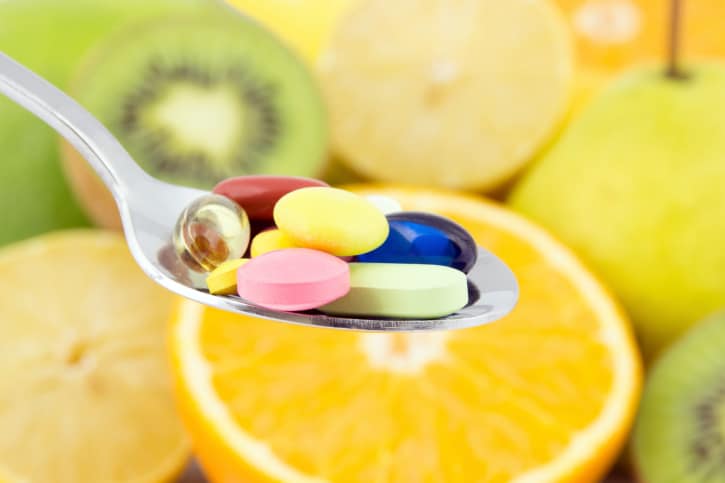
What's a few drinks with co-workers or friends while you're networking or enjoying a party? In the moment, nothing but casual fun (and maybe some extra liquid courage), but if this is your weekly routine the effects may hang around longer than your buzz. At some point, the drinks will catch up to you and your liver and take a serious toll on your health. Looking into your eyes isn't the only way to tell if it's time to give your liver a break. Here are more physical symptoms to look out for.
Fatigue
I'm not just talking about the day after hangover. Consuming alcohol affects your body's absorption of B12, an essential nutrient. This can cause fatigue and even make you light-headed in some cases.
Brittle Nails and Hair
Alcohol is seriously dehydrating and if there's one thing your hair and nails need to stay healthy it's proper hydration. Drinking alcohol on the regular can make your hair dry and brittle, and possibly lead to hair loss.
A Bigger Belly
You may not drink beer, but you can still get what looks like a beer belly! Alcohol is full of empty calories that tend to collect around your middle.
Bad Memory
You might not remember much after a "sunglasses and Advil" night of drinking, but heavy drinking over time can lead to memory loss issues. Wernicke-Korsakoff's Syndrome is a dementia-like illness that is caused by a lack of vitamin B1.
RELATED: The Shocking Symptoms Of Alcoholism
Anxiety
If you notice yourself feeling more moody - anxious, irritable or nervous - you may be able to blame it on the alcohol. Even drinking small amounts of alcohol can amplify your emotions.
Also, alcohol depletes natural chemicals in the brain that are necessary for keeping your mood positive and reducing anxiety.
How to limit your alcohol intake
Stopping drinking alcohol can be a challenging but ultimately rewarding process. If you're looking to quit or limit your drinking, here are some steps and strategies to help you on your journey to sobriety:
- Acknowledge the Problem: The first step in quitting drinking or reducing your intake is recognizing that you have a problem with alcohol. Accepting that you need to make a change is crucial.
- Set Clear Goals: Decide on your goals for quitting. These could include abstinence, reducing your drinking, or quitting for a specific period. Having clear objectives can help you stay motivated.
- Seek Support: Reach out to friends and family who can provide emotional support. Consider joining a support group like Alcoholics Anonymous (AA) or SMART Recovery. Professional counseling or therapy can also be beneficial.
- Identify Triggers: Recognize the situations, emotions, or stressors that trigger your drinking. Once identified, you can work on healthier coping mechanisms.
- Create a Supportive Environment: Remove alcohol from your home to reduce temptation. Surround yourself with people who support your decision to quit.
- Develop Coping Strategies: Find alternative ways to cope with stress, anxiety, or boredom. Engage in activities you enjoy, exercise regularly, practice mindfulness, or learn relaxation techniques.
- Set Boundaries: Communicate your decision to quit with friends and loved ones. Let them know your boundaries and ask for their support in avoiding alcohol-related events.
- Avoid Triggers: Stay away from situations or places where you're likely to be tempted to drink. If necessary, decline invitations to events where alcohol will be present.
- Stay Accountable: Keep a journal to track your progress and setbacks. This can help you stay accountable and identify patterns in your behavior.
- Reward Yourself: Celebrate your achievements along the way. Treat yourself to something special as a reward for reaching milestones in your sobriety.
- Educate Yourself: Learn about the effects of alcohol on your health and well-being. Understanding the risks can provide motivation to stay sober.
- Consider Professional Help: If you find it difficult to quit on your own, seek professional help. A doctor or addiction specialist can provide guidance, medication if necessary, and a personalized treatment plan.
- Stay Patient: Be prepared for setbacks or relapses. It's a common part of the recovery process. Instead of giving up, use it as an opportunity to learn and grow.
- Stay Connected: Maintain your support network even after achieving sobriety. Regularly attend support group meetings and continue to lean on friends and family for support.
- Celebrate Your Sobriety: Sobriety is a significant accomplishment. Celebrate your journey and the positive changes it brings to your life.
Remember that quitting alcohol is a personal journey, and it may take time and effort. It's important to be kind and patient with yourself throughout the process. If you're struggling, don't hesitate to seek professional help, as addiction is a serious health condition that often requires medical intervention and support.
Visit the BlackDoctor.org Substance Use center for more articles.









